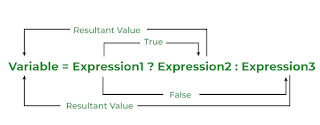Conditional operator in C
Syntax of the Conditional Operator
The syntax of the conditional operator in C is straightforward:ccondition ? expression_if_true : expression_if_false
Flowchart of Conditional/Ternary Operator in C
To understand the working better, we can analyze the flowchart of the conditional operator given below.
Purpose and Benefits
The primary purpose of the conditional operator is to simplify the writing of conditional statements. It provides a concise way to express if-else conditions in a single line of code. This can improve code readability and reduce the number of lines, making the code more elegant and efficient.Example Usage
Let's explore various scenarios in which the conditional operator can be used effectively.Here's an example of how to use the conditional operator in C:
c#include <stdio.h>
int main() {
int num = 10;
char* result;
// Using the conditional operator to assign a value to 'result' based on the value of 'num'
result = (num % 2 == 0) ? "Even" : "Odd";
printf("The number %d is %s\n", num, result);
return 0;
}In this example:
1. We have an integer variable num with the value 10.
2. We use the conditional operator (num % 2 == 0) ? "Even" : "Odd" to determine whether num is even or odd.
3. The condition (num % 2 == 0) is evaluated first. If it's true (which it is in this case because 10 % 2 equals 0), then the string "Even" is chosen as the result.
4. If the condition is false (i.e., if num were odd), the string "Odd" would have been chosen as the result.
5. In this example, since the condition is true, the variable result is assigned the string "Even".
6. Finally, we print the result, which says "The number 10 is Even" because num is indeed even.
Example 2: Determining Even or Odd
cint num = 7;
char* result = (num % 2 == 0) ? "Even" : "Odd";Here, the condition (num % 2 == 0) checks if num is even or odd. Depending on the outcome, it assigns either "Even" or "Odd" to the result variable.
Example 3: Handling Edge Cases
cint value = get_some_value();
int result = (value < 0) ? 0 : value;In this case, if get_some_value() returns a negative number, the conditional operator ensures that result is assigned 0 instead of a negative value, effectively handling an edge case.Example 4: Converting a Boolean to a String
cint flag = some_condition();
const char* status = (flag) ? "True" : "False";This example demonstrates how to convert a Boolean condition into a human-readable string representation using the conditional operator.Nesting Conditional Operators
It is also possible to nest conditional operators to handle more complex conditions. However, it's essential to maintain code readability when using nested ternary operators.cint x = 10;
int y = 5;
int z = 20;
int max = (x > y) ? ((x > z) ? x : z) : ((y > z) ? y : z);Here, we use nested conditional operators to find the maximum of three numbers (x, y, and z).
Best Practices
While the conditional operator is a valuable tool, it should be used judiciously. Here are some best practices:Keep it Simple: Use the conditional operator for simple conditions. For complex conditions or multiple branches, consider using traditional if-else statements for improved readability.
Parentheses: Use parentheses to clarify the order of evaluation, especially when nesting conditional operators.
Descriptive Variable Names: Use meaningful variable names to make your code more understandable.
Avoid Side Effects: Be cautious when using expressions with side effects (e.g., function.
Conclusion: The conditional operator (?:) in C is a versatile and concise tool for handling conditional expressions. It simplifies decision-making and assignment of values based on conditions, contributing to more efficient and elegant code. By following best practices and using it judiciously, you can harness the power of the conditional operator to write clean and readable C code. calls) within the conditional operator, as it can make the code less

.png)



.png)
.png)
.png)

0 Comments